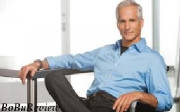
Jeff Klein, an ambitious and energetic
guy, has written a book with the same attributes and confesses that he "loves to work."
"Working for Good," subtitled Making a Difference
While Making a Living, would seem indispensable for energetic, ambitious entrepreneurs and visionaries who have a strong
social conscience as well as a robust business ethos.
Klein's book is a primer on how to make the most out of our working lives - by infusing whatever we do to make a
living with our passion and ideals. As well as a healthy commitment to the growth and development of ourselves and our communities,
Klein takes a refreshing bottom-up approach to the bottom line of our individual endeavors. Not exactly new news
here, but some of his techniques to accomplish these goals are pretty rad.
Still, there remains some residual uneasiness about combining wisdom tradition principles with books about commercial
enterprise, though the Buddha did enjoin us to engage in right livelihood. "Working for Good" is a great
place to start on the path to Conscious Capitalism, with Klein's intention "to provide a meaningful context and essential
tools to support you in deeply and fully expressing your humanity through your work; to open to the vulnerability that makes
you invulnerable; to establish a sense of aspirational purpose grounded in principles that sustain you in the face of adversity;
and to find rich experience and deep fulfillment."
Ambitious and energetic enough? Man, if one book could do all that, pigs would be flying through the stratosphere
by now.
Klein might have a regret
or two about using John Mackey, CEO of Whole Foods, as the lynchpin of his Conscious Business model. But if we
keep Mackey's personal quirks out of the picture - and by now they are legion -- what we get is the Working for Good model
of Five Essential Skills necessary for going from "me-centered to we-centered thinking." To shore up
this point, Klein points out that "Brain research indicates that doing good for others creates pleasure for the do-gooder
on a biochemical level." (Which should mean that altruism is a no-brainer.)
In the same vein, Whole Foods' "Declaration of Interdependence" explicitly
states that the company's purpose is "to serve people and planet." (One wonders how Mackey's denial of
global warming, and his controversial stance on health care, fits into this mission statement, but this is somewhat beside
the point. It would seem indisputable that Whole Foods has created a successful business model.)
There's an awful lot of positivist thinking in "Working
for Good," which is okay up to a point, as long as it doesn't veer into grandiosity. "Our thoughts drive
our actions, which manifest our reality." Again - up to a point. We are not lords of the universe
who control all elements of our existence; we also have to work with what others manifest. (And even though it's
all empty on the ultimate level, we're talking about relative reality here, where karma most definitely still operates.) "Knowing
our purpose is critical and knowing ourselves is essential," Klein adds, with an important section on "Addressing
the Missing Pieces: Blocks, Holes, and Shadows."
"By reflecting on ourselves and engaging in authentic dialogue with others, we can recognize our unproductive,
unconscious patterns and, with open-hearted compassion, recognize that they do not have to rule, limit, or define us. We
can soften into them and understand how they serve us, both in a practical way and as teachers to guide us to new levels of
self-awareness and mastery."
What
are the Five Essential Skills? Awareness, Embodiment, Connection, Collaboration, and Integration. Each gets
its own chapter, along with exercises designed to help embody them. In this sense, the book is like a manual for
meditation, but then there are somewhat unsettling statements like "The challenges facing humanity are clear opportunities
for business."
Happily,
Klein is coming from a highly ethical and beneficently-motivated place. "Working for Good" is really
a clarion call about waking up in the world of work: "Conscious choices . . . tend to be more effective than
unconscious reactions."

